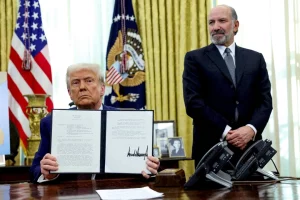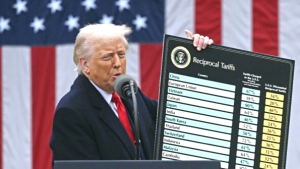The International Monetary Fund (IMF) issued a sharp warning in April 2025 through its latest news analysis, stating that President Donald Trump’s broad new tariffs could cause a “major negative shock” to the global economy. Among economists, investors, and politicians, these policies—including a 10% baseline duty on all imports and a 245% tax on Chinese goods—have sparked widespread concern.
Citing these taxes as a major cause in the expected economic decline, the IMF has lowered its global growth projection to 2.8%. Citing these tariffs as a major cause in the expected economic slowdown, the IMF has lowered its worldwide growth projection to 2.8%.
SoWhat?


The IMF’s warning concerns the actual consequences that could impact jobs, prices, and global economic stability, not just figures on a page. Investors, politicians, and everyday people must all understand these consequences if they are to make informed decisions. Investors, legislators, and ordinary people all need to grasp these consequences.
1. Global Growth Takes a Hit
The IMF’s cut in global growth to 2.8% highlights the pervasive impact of the tariffs. These tariffs can reduce consumer spending and corporate investment by raising the price of imported products, hence causing slower economic development.
Particularly, emerging markets can struggle under tighter financial conditions and lower export demand. Particularly, emerging markets may face difficulties as they confront lower export demand and more constrained financial conditions.
2. Financial Markets React with Volatility
The tariffs have caused financial markets to react more erratically. Stock indexes have witnessed notable swings and bond markets have seen yield changes as investors reevaluate risk. Uncertainty like this can lead to less investment and increased wariness among companies and consumers. This ambiguity might cause consumers and companies to invest less and be more cautious.
3. Supply Chains Disrupted
Particularly in sectors that depend on foreign components and materials, the tariffs have disrupted global supply networks. Higher manufacturing expenses and delays for companies could lead to higher consumer prices and reduced competitiveness. Higher manufacturing expenses and delays could result in companies, leading to consumer price increases and reduced competitiveness for enterprises.
4. Inflation Pressures Mount
Higher levies on imported products could lead to customers noticing increasing costs on daily necessities. As central banks react to increasing inflation rates, this inflationary pressure may reduce buying power and maybe cause a stricter monetary policy. As central banks react to increasing inflation rates, this inflationary pressure may weaken purchasing power and possibly cause a more strict monetary policy.
5. Calls for Policy Coordination
The IMF has called on nations to cooperate in resolving trade disputes and preventing further escalation. To offset the adverse effects of the tariffs and rebuild faith in the world economy, coordinated policy actions are crucial. Coordinated policy responses are crucial for minimizing the negative effects of tariffs and rebuilding confidence in the global economy.
Quick link: Expo 2025 Opens in Osaka, Showcasing a Global Vision of Innovation and Culture
Takeaway For You…
Whether you are a legislator, investor, or simply someone concerned about the economy, staying informed about these changes is crucial. Whether you’re changing investment plans, supporting policy reforms, or being ready for possible economic changes, knowing the effects of trade policies will enable you to make better choices.
Whether you’re changing investment strategies, supporting policy reforms, or preparing for potential economic shifts, understanding the consequences of trade policies will help you make more informed choices.
Final Thoughts
The IMF’s alert serves as a vital reminder of the world economy’s interdependence. President Trump’s tax policies have far-reaching consequences that extend beyond national borders, influencing development, stability, and prosperity worldwide. Trade tensions necessitate proactive conversations and cooperative solutions from world leaders to safeguard economic well-being.
Stay Ahead Effortlessly with SoWhat?
Want to stay informed without endless scrolling? SoWhat? is your AI-powered insights assistant, delivering concise, personalized reports on world events straight to your inbox—every 24 hours. Stay sharp. Stay informed. Get your free daily report HERE.












